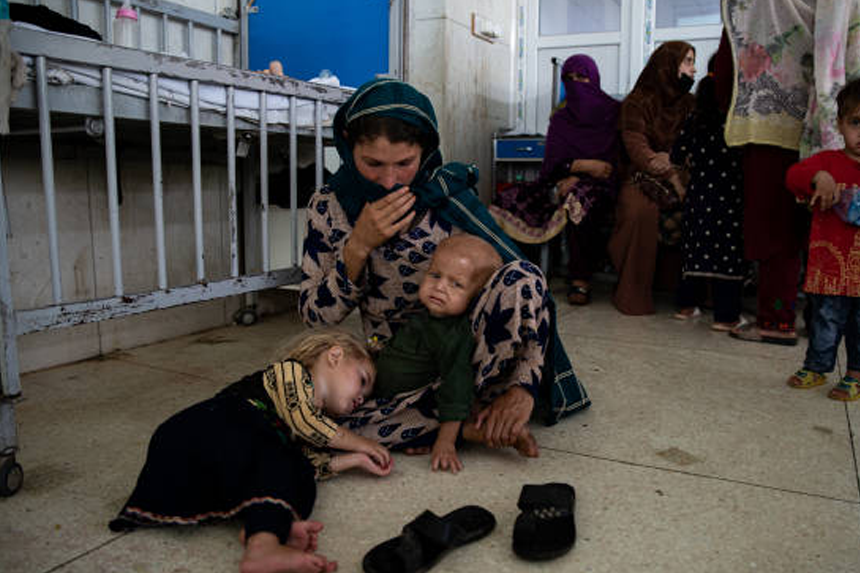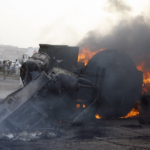What Is the Devastating Toll on Families?
For me, this qualifies as doomsday. I’m really at a loss. Laments Amina, can you imagine what I have seen as my children die? Amina’s pain is evident, having lost six children—none of them lived past the age of three—and with another currently battling for her life.
- What Is the Devastating Toll on Families?
- How Did This Crisis Reach Such Unprecedented Levels?
- What Are the Heartbreaking Accounts from the Ward?
- How does This Crisis strain the Healthcare System?
- What Are the Glimpses of Hope and Despair?
- How Is the Growing Pressure Affecting Hospitals?
- What Is the Extent of the Stunting Crisis?
- Is There a Glimmer of Hope Amidst the Crisis?
Severely malnourished seven-month-old Bibi Hajira sleeps half a bed at the malnutrition department of Jalalabad Regional Hospital in eastern Nangarhar province, Afghanistan. Reflecting the terrible circumstances of many others, she is the size of a newborn.
Amina tells of her dire circumstances: “Poverty is killing my children. All I can give them is dry bread and water warmed from being left under the sun. Her sad tale is not unusual; early treatment might save countless lives.
How Did This Crisis Reach Such Unprecedented Levels?
Among the 3.2 million youngsters experiencing acute malnutrition in Afghanistan is Bibi Hajira. Forty years of war, tremendous Poverty, and recent Taliban control have aggravated this condition to unheard-of degrees.
Consider the 3.2 million youngsters involved—stories from one hospital room provide a window into this developing catastrophe. Eighteen toddlers in the ward are sleeping in seven beds. It is an everyday reality, not a periodic outburst. The quiet is unsettling; the only sound disturbing is the pulse rate monitor beeps. Most children are awake but too feeble to move or produce noises.
What Are the Heartbreaking Accounts from the Ward?
Distributing three-year-old Sana, who is wearing a purple tunic, is Bibi Hajira’s bedmate. Her aunt Laila currently looks after her mother after she passed away during delivery. To represent the seven children Laila has lost, she raises seven fingers.
Three-year-old Ilham is sleeping in the next bed; her skin is flaking off her arms, legs, and face. Three years ago, aged two, his sister passed away. With her stunning hazel eyes and long lashes, one-year-old Asma sleeps without blinking as she breathes forcefully into an oxygen mask. A doctor notes, “I doubt she will survive.” Asma’s body gave in to septic shock.
Though the situation was terrible, there was a stoicism in the room—nurses and mothers carefully tending to the children. This falls apart as Asma’s mother, Nasiba, kisses her daughter and starts to cry. “My body seems to be losing the flesh like it is dissolving. Her tears show me how intolerable her pain is. Already, Nasiba has lost three children. “My man works as a worker. We eat when he starts work.
How does This Crisis strain the Healthcare System?
Asma may have a heart attack at any time, the doctor says. We leave the room, and she dies one hour later. More than three a day, the hospital notes that 700 youngsters have passed away within the last six months. The startling count would be greater if not for the World Bank and Unicef money keeping the facility running.
International payments supporting public healthcare in Afghanistan were stopped in August 2021 following the Taliban takeover under international sanctions. The healthcare system crashed as a result. Although aid organizations responded temporarily, funding has subsequently dropped. Restraints on women by the Taliban administration have also made donors reluctant to help.
Deputy spokesperson for the Taliban administration, Ham Abdullah Fitrat, notes, “We inherited the problem of Poverty and starvation, which has gotten worse because of natural calamities like floods and climate change. The world community should boost humanitarian assistance; they should not link it with political and domestic concerns.”
What Are the Glimpses of Hope and Despair?
Visits to more than twelve medical facilities expose the fast-worsening state of affairs. Every visit attests to the fact that correct treatment can save lives. Once in serious condition, Bibi Hajira was released, and she is far better.
“We could rescue more children if we had additional facilities, drugs, and personnel. Our team is quite committed. A doctor comments, “We work nonstop and are ready to do more.” “I have children, too.” We, too, suffer when a youngster dies. I understand what has to pass through the parents’ hearts.
Rising death rates have more causes than malnutrition. Other avoidable, treatable illnesses also have a role. Six-month-old Umrah fights severe pneumonia in the intensive care unit next to the malnutrition ward. Tears ran down her cheeks, and Nasreen, her mother, sat by her side. I wish I could pass away in her place. She says, clearly afraid. Two days later, Umrah passed away.
These tales only represent those who make it to the hospital. Many more do not. At Jalalabad Hospital, just one in five children requiring therapy can get it.
How Is the Growing Pressure Affecting Hospitals?
Jalalabad Hospital is under enormous pressure. Three-month-old Aaliyah is taken into the empty bed almost right away after Asma dies. There is no time to handle the loss; another sick youngster needs care.
Serving five provinces, the hospital attends to a population of around five million. The flood of more than 700,000 Afghan refugees forcibly expelled by Pakistan and currently living in Nangarhar complicates matters even further.
What Is the Extent of the Stunting Crisis?
45% of children under five in the surrounding towns are stunted, shorter than they ought to be given their age. Mohammed, Robina’s two-year-old son, is far smaller than he should be and cannot stand.
“The doctor assures me he will be OK if he receives three to six months of treatment. Still, we need help to afford meals. How will the therapy be paid for?” Robina inquires. Last year, she and her family were compelled to flee Pakistan; today, they reside in a dry hamlet near the Sheikh Misri region, a short drive from Jalalabad.
Robina says, “I’m worried he will get crippled and never be able to walk.” “We also led complex lives in Pakistan. Still, there remained a job to do. Here, my worker husband hardly gets employment. Should we still be in Pakistan, we could have treated him.
Stunting may cause serious, permanent physical and cognitive harm, according to Unicef, which will influence the child’s whole life as well as subsequent generations. “Economically, Afghanistan is already having trouble. A medical practitioner wonders how our society will be able to assist those of our future generation who are either physically or psychologically disabled.
Is There a Glimmer of Hope Amidst the Crisis?
With quick therapy, Mohammed can prevent lifelong injury. However, financing for community nutrition initiatives has been drastically reduced; several have just gotten 25% of the required amount.
Families with malnourished or stunted children abound in the alleyways of Sheikh Misri. With two starving children—eight-month-old Mujib and three-year-old Umar— Sardar Gul holds Mujib on his lap.
“Mujib’s weight decreased a month ago to less than three kg. We began getting food sachets after we could register him with an assistance organization. Those have truly benefited him, Sardar Gul says. Mujib now weighs six kg, still underweight but much better. This development emphasizes how quickly intervention may rescue youngsters from impairment and death.








